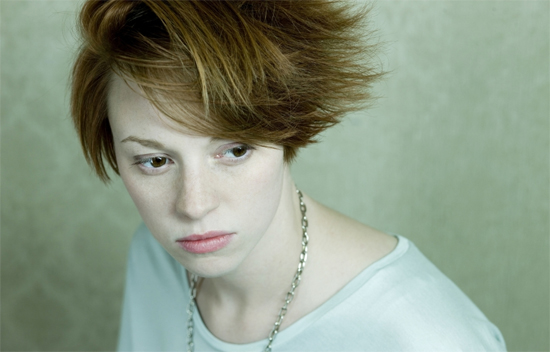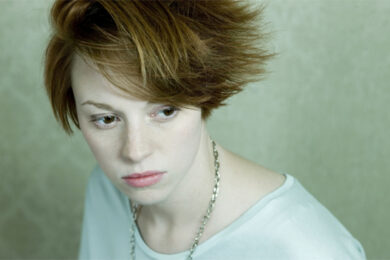"You know it’s not underground any more when that happens" says La Roux, or Elly Jackson as she’s known to The Bill‘s Sergeant June Ackland, of being recognised by a laundrette attendant during a recent photo shoot for Quietus pals The Stool Pigeon in Portsmouth.
Sitting in the vast offices of the Universal group drinking a paper cup of stern-looking tea, Jackson looks incredibly young in the flesh, her boyish frame sat down in a sofa. She’s far from shy and retiring though, refreshingly smart, verbose and entirely unafraid to speak her mind without being gobby, whether it’s blasting what she sees as America’s ignorance of electronic music, or how women are represented in the pop world.
What with her label being the corporate monolith that had seven out of the ten acts in the preposterous BBC tips for 2009 at the start of the year, it was easy to be cynical about the appearance of La Roux and her mysterious co-writer Ben Langmaid. Surely she was just another puppet, her strings pulled by a major label world bored – like we all have been – by landfill indie and lumped in with the Xenomania-knock off of Little Boots, and the cut price Kate Bush "I fell out of a tree OMG" wackiness of Florence and The Machine? The answer, it has subsequently emerged, is an emphatic ‘no’.
For starters, La Roux didn’t actually have it all easy. The songs that make up her debut album were four-and-a-half years in the making, no mere flashes in the pan dreamed up by a song writing team as is the pop norm. Her debut single, last year’s ‘Quicksand’, paid a brief visit to Number 133 in the charts before disappearing. Music biz sources tell The Quietus that mainstream radio producers were initially extremely reluctant to add follow-up ‘In For The Kill’ to their playlists, only capitulating when the single started to sell, and sell, and sell…
That track has now shifted nearly half a million copies, and La Roux sold out her autumn date at London’s Scala in five minutes. Her next single ‘Bulletproof’ has the potential to do even better than the last and, more importantly, her eponymous debut album is packed with killer tracks, opening with a slew of superlative pop bangers before introducing slower material that, for once, doesn’t drag out the stools of R&B that have formed the filler on every disappointing British pop album over the past two decades. Yes, so her music is built around Langmaid’s judicious deployment of lush synthesiser arrangements and sprightly beats, but La Roux is never an album that’s merely an 80s retread.
Indeed, the broadsheet pieces written about La Roux have generally been embarrassing pieces with journalists knocking back Taboo in a queasy quest to be a talking head on the next series of I Heart 1984. Doesn’t that get frustrating?
"I don’t get it either. Obviously there’s elements of Human League, Heaven 17, Blancmange and Simple Minds, we’re not denying that because those were our influences with the album. But we certainly haven’t just gone and tried to recreate 80s music. I think ‘Quicksand’ is probably the most 80s sounding song on the album. But I never thought of ‘In For The Kill’ as an 80s sounding record. But because it’s all synths, people go ‘oh, 80s’. It’s just pop music! The Eurythmics was never seen as electropop, it was just pop music. Neither was Depeche Mode, it’s just pop music."
So you’re not into that awful I Heart the 80s shtick?
"Legwarmers and shoulder pads and bouffant hair, stuff like that, no. This is a fifties-inspired quiff! Get a grip."
You grew up listening to all sorts of music, from rock & roll to folk, did doing everything electronic evolve gradually?
"It did. That’s another thing, I’ve read an article on the Guardian website that someone sent to me where there was the most ridiculous debate going on, saying ‘this isn’t really electronic music is it, because it’s shiny pop stars, La Roux is not forging the way for really good underground electronic music because she’s presenting herself like a shiny pop star’. Well a) I never set out to present myself as a shiny pop star, I’ve just had good pictures taken of me, fuck off and b) it’s obviously pop music, but I don’t think it’s the shiniest album you’ve ever heard, and c) unless you’re mainstream, how on earth are you supposed to forge the way for anything? If I stayed underground, the music stays underground. There’s no other way of being successful, or bringing a certain type of music into the foreground, without being in the charts. So that argument is totally contradicting itself.
Is it quite exciting to feel that you’re bashing into the mainstream? I mean, you’ve sold half a million records, that’s quite a feat these days
"Radio didn’t expect, not that they didn’t want it to or weren’t hoping for it to, but no one expected anyone to jump on this."
Did you expect it?
"Me and Ben were always quietly confident. Ben was always like ‘I don’t agree, this is a big tune, I think it’ll speak to people, I don’t think everyone’s necessarily right’. We were quiet about it, but he said ‘If other people can hear what I can hear in this tune and in your voice, then people will respond to it’. I think it’s great when music does that without being shoved in people’s faces, it’s always much more rewarding."
But I suppose now you’re the person on constant rotation on the radio…
"That’s what’s weird, you’re suddenly part of that thing you were fighting against, and you can’t complain any more. I think essentially, not that I’ve ever really tried to do this, but one of the coolest things that hit me about being in the mainstream and lots of people knowing about you that you can’t have if you’re underground, is that you can have an effect on people. It’s all very cool being in the underground, but you only ever reach about 50,000 people, if that.
"I was in a pub the other day, and these two girls followed me into the toilet and said ‘excuse me, are you La Roux?’ And I was so touched because she went ‘you make me feel better about being the way I am.’ She had short hair, I don’t think she was a lesbian, she wasn’t some big butch woman coming over and going [adopts big butch voice] ‘yeah wicked, you make lesbians alright’, it was a girl with short hair, who wasn’t very girly, who didn’t have a tan, who didn’t have massive boobs, didn’t wear high heels. She was just a girl like the kind of girl I’ve been when I’ve been growing up, and she was saying ‘we think it’s really cool that there’s someone out there who’s a role model for people like us, because there’s no one for us to look up to any more since David Bowie’. I though that’s fucking cool, that’s amazing. Even if my music is retro, or whatever, even if it’s shit, at least there’s someone out there for girls to look up to who doesn’t have boobs and a tan and high heels."
What’s your stance on the way that female musicians either choose to or are forced to use a sexuality that’s essentially just designed to appeal to men?
"It’s really patronising to women. I know that there’s far more ways to be sexy than to dress in a miniskirt and a tank top. If you’re a real woman you can turn someone on in a plastic bag just by looking at them. That’s what a real woman is, when you’ve got the sex eyes. I think you attract a certain kind of man by dressing like that. Women wonder why they get beaten up, or having relationships with arsehole men. Because you attracted one, you twat. It’s a funny culture, it’s definitely a funny culture. Those women are just insecure, but they’ll turn round to me and say ‘you’re just jealous ‘cos you want a tan and you want big boobs, stupid boy-looking girl’. You can’t win, they wouldn’t believe me for a second."
Do you deliberately try and subvert all this?
"It was more just being who I am. Of course it’s slightly exaggerated, to fight back against that in a way. Thinking that if I’m going to do it, I’m going to go all the way the other way."
How do you see La Roux evolving?
"Talk Talk and New Music and some of the later Heaven 17 stuff like How Men Are, the slightly more epic stuff, and Tears For Fears. And a bit more Young Americans, get some saxophone on there, make it a bit more soulful. [sarcastic tone] Maybe have Timbaland on there, someone like that?"
Haha. So I take it you’re not going to ask him?
"No fucking way mate. I remember Lady Gaga asked me, and I don’t think she knew that I was a duo, [adopts American cocaine fashbitch voice] ‘So who did you make your album with’, so I explained, and she said ‘so who are you going to work with on your next record?’ and I said ‘Ben Langmaid’, and she said ‘aren’t you going to want to work with other producers, guys like Raekwon or Timbaland or someone like that, you can’t turn that down’. And I said ‘yeah I can’. ‘Cos they wouldn’t know me, and wouldn’t understand me, and if I went out to LA someone would say ‘you’d like nice in a dress’, and I’d have to say ‘fuck you’."
Are you comfortable with how big it might get?
"Not really, no. The other day I was really stressed and talking to my sister and she said ‘babe, we never knew it was going to go this big. We knew you had good songs but we never expected it, and we can understand why you’re not dealing with it’. I got followed home by photographers the other day, and thought ‘this is fucking horrible, I don’t want it’."
Are you scared?
"Yeah I am a bit. Even if you retire at 30 are people going to stop being interested in you, and who you’re going out with? Of course they’re not. It’s already fucked, mate, it’s fucked."



